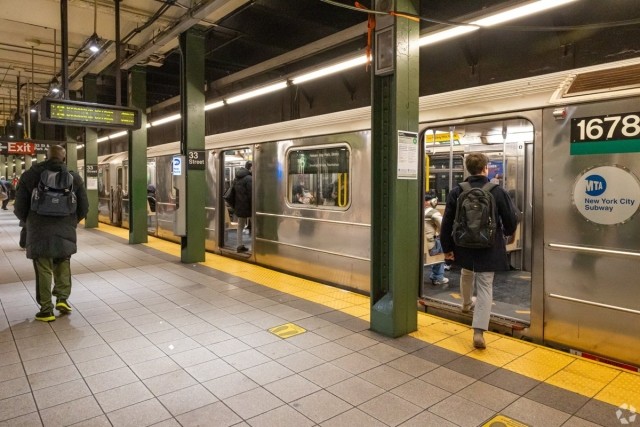Housing Choice Voucher Section 8 Program Updates: NYCHA has paused voucher issuance for applicants on the general Section 8 waitlist as of August 1, 2025. Read more about it in the FAQs or at NYCHA's website.
NYC is one of the most expensive cities in the U.S. with an average rent of $4,022/month and a cost of living 131.5 percent higher than the national average. Even with its high cost, people still flock to the city — the opportunities, energy, and liveliness that NYC offers its residents are unmatched.
Not everyone makes enough to afford the expensive rent in NYC, so there are many programs to help with rent assistance and affordable housing. One of those is the NYC Housing Choice Voucher program (HCV) run by the New York City Housing Authority (NYCHA), also known as Section 8.
The NYU Furman Center reported that only 53 percent of NYCHA voucher recipients were able to lease a home in 2022. It is a tough process for many reasons, so to help you navigate it successfully, we have compiled everything you need to know.
- What is the NYC Housing Choice Voucher program?
- How the Housing Choice Voucher program works in NYC
- Rights and protections for voucher holders
- Voucher Payment Standards
- The Housing Choice Voucher process
- How to apply for Section 8 NYC
- How to find Section 8 Housing
- Responsibilities of Housing Choice Voucher holders
- Common roadblocks and how to solve them
- Tips for renters with Housing Choice Vouchers
What Is the NYC Housing Choice Voucher Program?
There are a couple of HCV programs in NYC, each run by a different entity. The largest is run by NYCHA and is what many people refer to when they say Housing Choice Voucher or Section 8.
HCVs are used by low-income renters to help cover housing costs and provide rental assistance. If you are an HCV holder, you will pay about 30 percent of the rent and then NYCHA will pay the rest to the landlord.
In New York City, it is illegal for landlords or brokers to refuse to rent to you based on your use of a Housing Choice Voucher. This protection falls under local source-of-income laws, which prohibit discrimination based on how you pay your rent.
How the Housing Choice Voucher Program Works in NYC
NYCHA specifically provides rental assistance to eligible households in the private rental market. It mostly gives out tenant-based vouchers, which are HCVs that tenants can use to find their own home in the private market. Project-based vouchers are for specific units inside certain buildings and the assistance is tied to the unit with some other stipulations.
Eligibility depends on your household size and total gross annual income. Applicants must fall below the limit for their household size to qualify. The portion that NYCHA pays goes directly to the landlord, to whom the renter also pays their share. All rentals go through a rigorous inspection process that happens regularly.
Rent reasonableness
The U.S. Department of Housing and Urban Development requires that NYCHA verify rent reasonableness. This ensures that the rent being paid is similar to comparable units in the same area. NYCHA will conduct a rent reasonableness analysis as part of its evaluations for lease-ups, lease renewals, and transfers.
NYCHA voucher income limits
To ensure that assistance is given to those who need it, NYCHA has set income eligibility limits. So, if your family’s income is below the specified annual income for your household size, then you are eligible (if you meet the other requirements too). It doesn’t guarantee you will receive assistance, but it means you can apply to be placed on the waitlist.
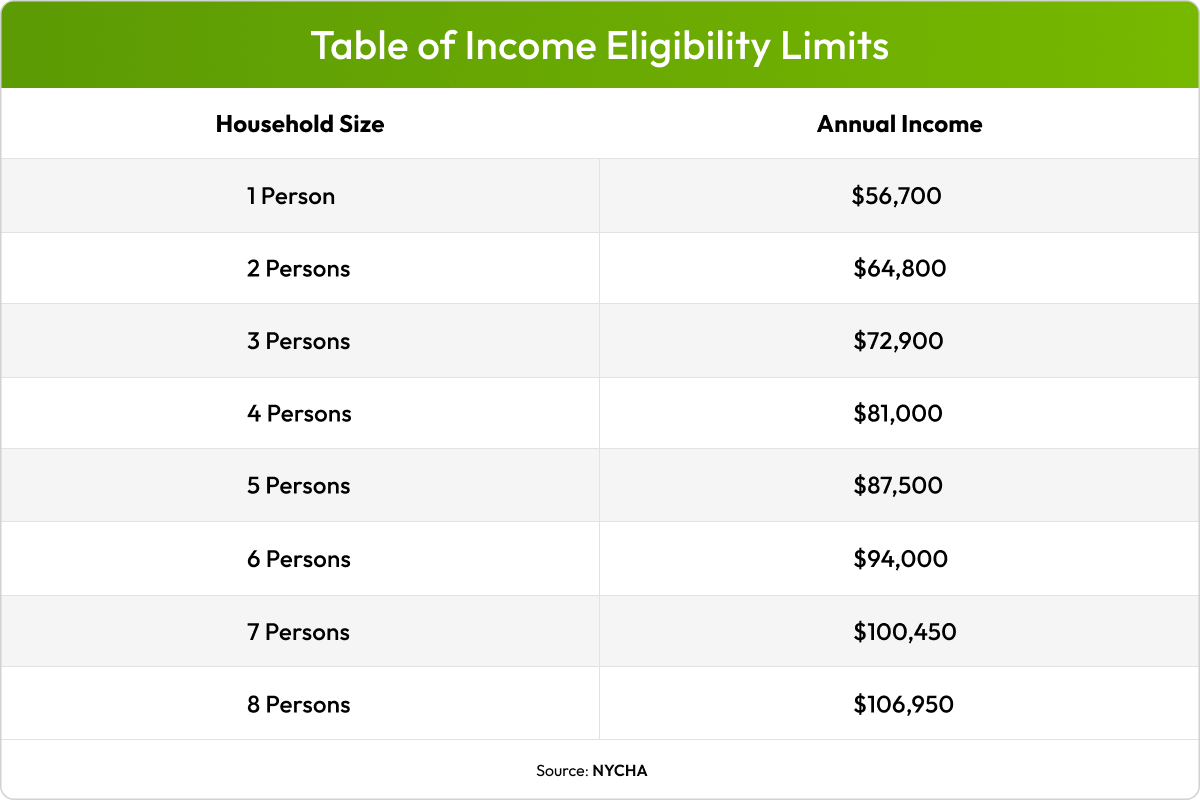
Occupancy Standards/Subsidy Standards
The Occupancy Standard (Subsidy Standard) on your HCV states the apartment size you’re able to rent based on the number of people in your household. Typically, it is two people per room. Sometimes, the make-up of your household can affect the Occupancy Standard. There are exceptions; you can rent a unit with more bedrooms if the rent is equal or lower to your Voucher Payment Standard (the highest amount NYCHA will pay the property owner). Or you can rent a smaller unit and NYCHA will pay based on the Payment Standard of that size.
CityFHEPS & Other Local Vouchers
Housing Preservation & Development (HPD) and New York State Homes and Community Renewal (HCR) also offer HCV programs. They operate a bit differently than the NYCHA HCVs. The HCR oversees a statewide HCV program that is administered by local Public Housing Agencies (PHAs) that anyone can apply to. For the HCV run by HPD, it is not open to the public and all applicants must be referrals from designated entities.
CityFHEPS and FHEPS are other rental assistance programs for low-income households. HUD-VASH is a team up of the HUD’s HCVs and the VA to support veterans. The HIV/AIDS Services Administration (HASA) also has programs to help with housing and rental assistance.
Rights and Protections for Voucher Holders
Landlords, property owners, brokers, and related professionals cannot discriminate by refusing to rent to you because you use a Housing Choice Voucher. As Housing Choice Vouchers are a lawful source of income, it is illegal for real estate professionals or related professionals to refuse to rent to you. When they refuse you, it's source of income discrimination (SOID). SOID includes publishing advertisements that say they will not accept vouchers or express a preference for non-vouchers.
If you think you have been a victim of SOID, there are many resources you can contact. The main one is the Commission on Human Rights. Other programs and organizations are:
- The Fair Housing Justice Center (FHJC): reports and responds to housing discrimination.
- The Housing Rights Initiative (HRI): finds and fights housing discrimination.
- Unlock NYC: offers a Rights Recorder which you can use to record evidence of housing discrimination and submit a report.
Voucher Payment Standards
The Voucher Payment Standard (VPS) is the maximum amount that NYCHA will pay to the property owner. It is based off of the Fair Market Rent (FMR) for each unit size that is established by HUD. The standard is usually between 90 percent and 110 percent of the FMR.
NYC Section 8 payment standards
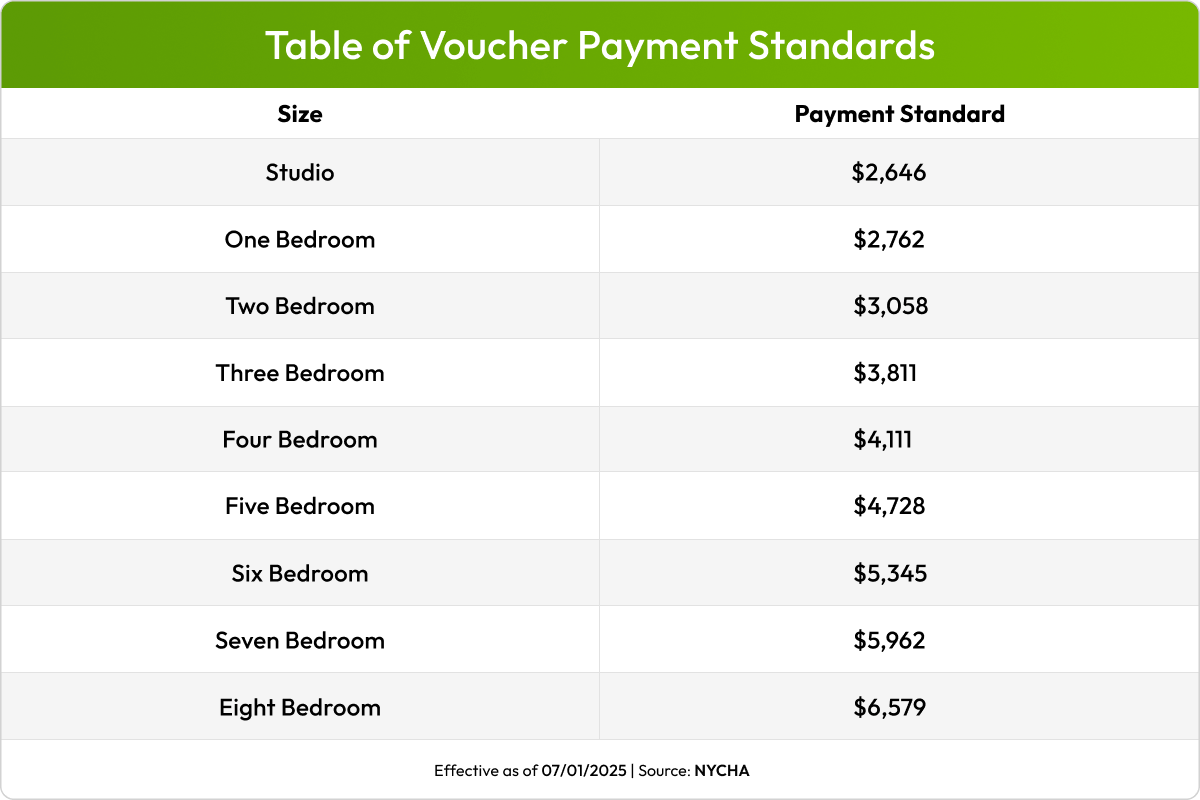
Exception Payment Standards
To open up high-opportunity neighborhoods to voucher holders, NCYHA has adopted Exception Payment Standards (EPS) for those areas. NYCHA says, “EPS are intended to expand housing opportunities in ZIP Codes that have lower rates of poverty and crime and have well-resourced schools.”
So, if you reside in one of those zip codes, your VPS will be based on that zip-code level FMR instead of the metropolitan wide FMR. It applies to those currently living in or going to live in high-opportunity neighborhoods.
Utility Standards
Utility Standards or Utility Allowance Schedules are payment standards for utilities. Utility payments are subtracted from the payment standard as deductions in the rent calculations that determines the maximum contract rent NYCHA will approve. This ensures that the gross rent (rent and utilities) stays within the VPS.
The Utility Standards are dependent on the size of the house/apartment as well as what kind of utilities you have. NYCHA has outlined the Utility Allowance Rates on their website.
The Housing Choice Voucher Process
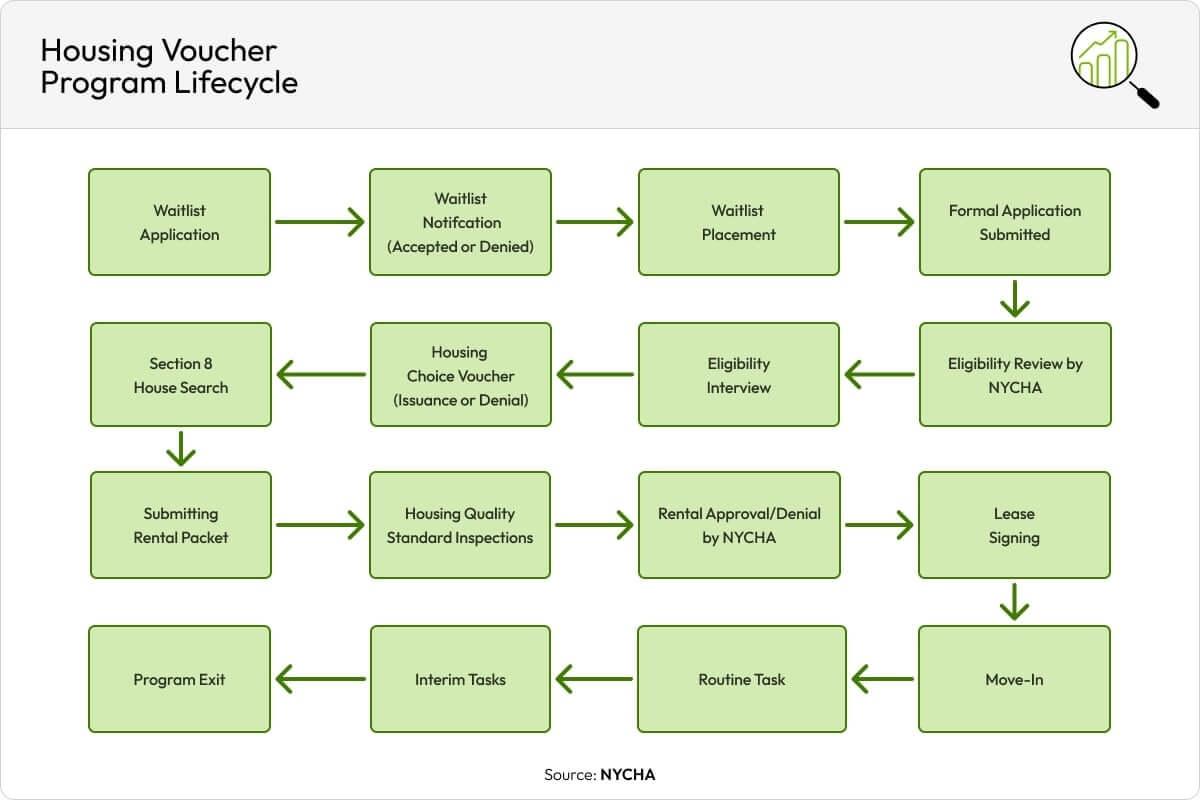
The lifecycle of the Housing Choice Voucher program typically follows this flow:
- Waitlist application
- Waitlist status notification (accepted or denied)
- Waitlist placement
- Formal application submitted
- Eligibility review by NYCHA (background checks, income verification, etc.)
- Eligibility interview
- Housing Choice Voucher issuance or denial
- Section 8 housing search
- Rental packet submission
- Housing Quality Standards Inspections
- Rental approval or denial by NYCHA
- Lease signing
- Move-in
- Routine Tasks
- Annual recertification
- Lease renewal or rent adjustment
- Regular inspections
- interim tasks
- Report changes in household composition, income, assets, and expenses within 30 days of the change
- Inspections at request
- Program exit
- Voluntary opt-out of HCV program
- Termination by NYCHA
How to Apply for Section 8 NYC
Currently the NYCHA HCV is closed to the public; last time it was open was from June 3–9, 2024. The best way to see if it is open is to check NCYHA’s website and stay up to date on news. If you submitted an application, then you can go to NCYHA’s Self-Service Portal to get updates.
Completing your application online is fast and easy, but you can request a paper application as well. The application process may change to NYCHA’s discretion but there are a couple of steps you should expect.
Waitlist application
You will fill out a waitlist application. If you are accepted, you will be placed on a waitlist in order of applicable preference and application date. On this application it requires information such as:
- Head of Household Information
- First, middle, and last name
- Date of birth
- Social Security Number
- Demographic information
- Disability status
- Contact info
- Household size
- Total annual gross income for household
- Criminal and sex offender status for household members
- Eviction history and dates
- Reason for applying
- Other household members
- First, middle, and last name
- Date of birth
- Social Security Number
- Demographic information
- Disability status
You will not have to submit any documentation at this time. Once you are reached on the waitlist and found eligible, you will be contacted to complete a full Section 8 application.
Additional information and background checks
Any additional information that is needed will be requested by NYCHA after you are picked from the waitlist. NYCHA will then conduct criminal background checks for all household members 16+.
Eligibility interview
This interview is to check that you are eligible. During this interview, all required information is reviewed and verified. This includes information such as household size, composition, income, and more. Any documentation and proof required to show you are eligible should be brought to this such as Social Security card, proof of citizenship, proof of income, bank info, etc.
Issuance
If you are found to be eligible then you will get a Housing Choice Voucher and attend a briefing about the program. The briefing will explain how the program works, your responsibilities, the housing search, and the next steps. If you are denied, you will get a written notification stating the reason for denial. To challenge it, request an informal hearing within 90 days of the Ineligibility Letter.
How to Find Section 8 Housing
Now that you have your Housing Choice Voucher, you can start searching for a home. On the HCV, you will find an expiration date that tells the date you must find a home by. You can request an extension under special circumstances. HCVs are valid for 120 days with an automatic 60-day extension from when it was issued. So, you have a total of 180 days to find a place and submit a finished rental packet.
If you cannot find a rental within that period, your voucher will become invalid, and you will have to reapply whenever waitlist applications open again. Longer extensions can be granted by NYCHA, at their discretion, for good cause.
NYCHA recommends considering these qualities when looking at neighborhoods:
- Quality of the unit/rental
- Nearby employment
- Schools and playgrounds
- Community and educational resources
- Public transportation
- Shopping
There are many ways to find Section 8 housing. Online resources are a popular way to find Section 8 housing, like Apartments.com. Find low-income housing by searching for whatever neighborhood in NYC that you are interested in. Then open the filters menu and scroll down to “specialty housing.” Under that section is “additional specialties” where you can select “low income/income restricted.” Once you’ve found a place you like, contact the landlord to find out more about their low-income or income restricted options by sending them a message on Apartments.com or calling them.
Outside of online resources, realtors and brokers are a great way to find housing if you don’t mind paying the associated fees. You can also look for Section 8 housing on bulletin boards or in newspaper ads.
When you find a place, NYCHA suggests asking the landlord certain questions. Remember, landlords cannot refuse to rent to you solely because you use a voucher.
- What is the monthly rent for the unit?
- Have you rented with Section 8 before?
- Have you rented this unit with Section 8 before?
- Will rent include the utilities, and if so, which are included, and which am I responsible for?
- Are there any fees associated with moving, such as broker fees or security deposits?
Completing rental packet
Once you have found a rental that you would like to lease, you will submit a rental packet to NYCHA. Submitting a completed rental packet pauses the countdown on your voucher’s expiration, so NYCHA can review your paperwork. The rental packet has documents that both you and the property owner must sign and complete. It can be submitted online by the property owner on the Owner Extranet. Common documents required are:
- Request for Tenancy Approval Form signed by you and property owner
- Lead-based paint disclosure signed by you and property owner
- Section 8 Property Owner Registration Form completed and signed by property owner
- W-9 Tax Form completed by owner
- And any other applicable documents
Housing Quality Standards Inspections: Section 8 Inspection Requirements
After you complete your rental packet, before you move in or even sign a lease, the unit or property must be inspected. This is a bit different from typical apartment inspections as the rental must meet the Housing Quality Standards (HQS) and some NSPIRE standards. NSPIRE will be the new standards once it is fully adopted by October 1, 2025 but NYCHA is already using some of NSPIRE's standards, such as for carbon monoxide and smoke alarms. Both NSPIRE and HQS are the basic requirements that all units or rentals must meet. Common examples of standards are:
- Heat
- Hot and cold water
- Operable window in living rooms and bedrooms
- Private bathroom
- Fully equipped kitchen
Inspections will happen before you move in and then regularly afterwards. It is not all about the property owner as you must do your part to maintain the property. This includes:
- Changing the batteries in smoke and CO2 detectors
- Not blocking fire escapes
If it fails for a life-threatening condition, then there is no way NYCHA will approve it until the issue is rectified. However, if it fails for a non-life-threatening (NLT) condition, then NYCHA can approve it with your consent. You also can wait until repairs are made or continue your search. If you accept the unit with NLT conditions, the property owner has 30 days to make repairs. If they fail to do so, NYCHA will give you a transfer voucher.
Signing a lease
Once the rental has passed inspection by NYCHA, then you can sign a lease with the property owner and move in. You’ll first get a conditional move-in letter, but this doesn’t mean you can move in yet. The property owner will sign a Housing Assistance Payment (HAP) contract. They’ll send that back to NCYHA along with a lease that is signed by both of you. Once you get the HAP Approval Letter, that is the signal for you to move in.
Responsibilities of Housing Choice Voucher Holders
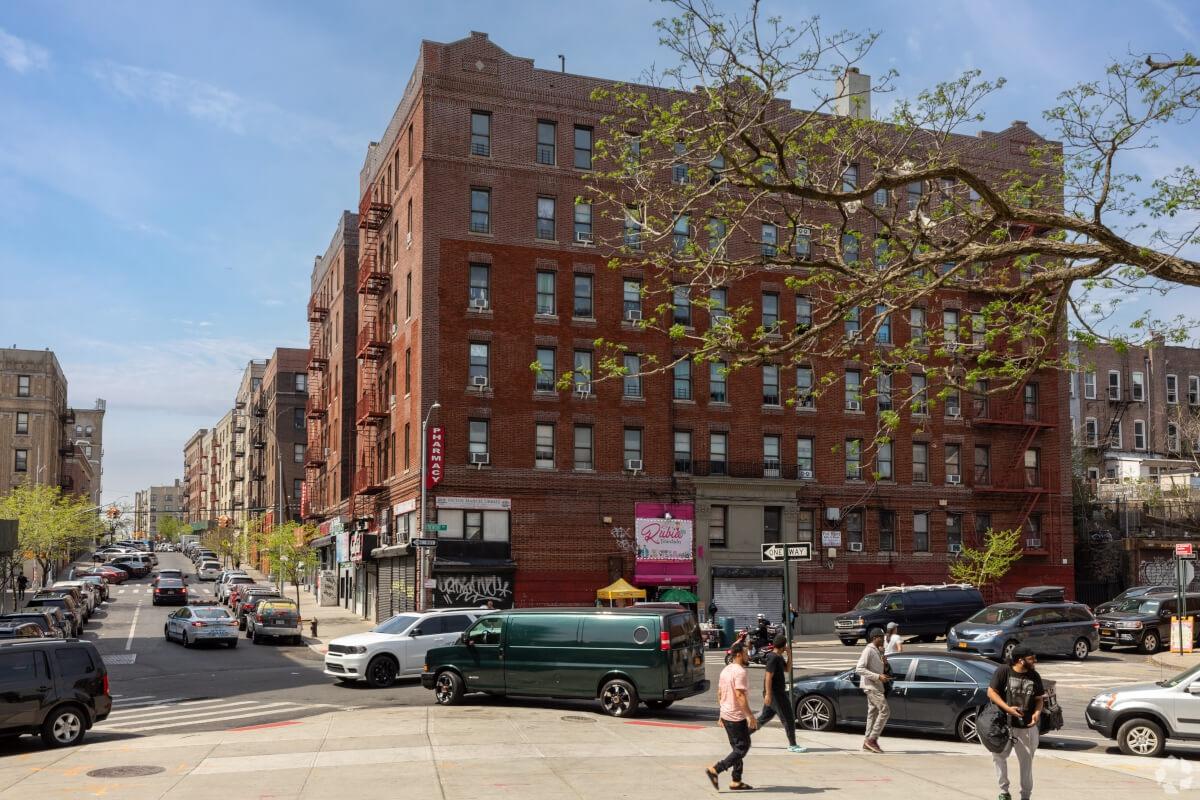
As an HCV holder, you have responsibilities that you must adhere to in order to keep your voucher. They will be listed on your voucher but some of the common responsibilities are:
- Completing annual recertification
- Reporting any changes in income, assets, and family composition
- Letting NYCHA or HUD inspect the rented unit
- Letting the property owner in to conduct repairs and maintenance
- Managing the rental to the Housing Quality Standards
- Adhering to conduct requirements and guidelines
- Following the lease signed by you and the property owner
How to complete Section 8 annual recertification
One of the biggest responsibilities for HCV holders is completing their annual recertification. You will get notified 150 days (roughly five months) in advance of your annual recertification due date; get started right away and don’t wait. It consists of giving NYCHA all the information about your family composition, household income(s), assets, and expenses. Submit all required documents and, if required, let your rental be inspected.
All documents can be submitted online through NYCHA’s Self-Service Portal. This includes:
- Affidavit of Income (one for each household member)
- Third-Party Verification form for household members 18+
- Any supporting documents
- Proof of income
- Assets
- Expenses
- Student Status
- Debts Owed to PHA (HUD-required document) for all household members 18+. This only needs to be done if it is not already on file with NYCHA.
Once you have completed your annual recertification, NYCHA will review and verify it before issuing you and the property owners a Voucher Payment Change Notification (VCN). This will state the total rent amount, your rent portion, and NYCHA’s subsidy amount. NYCHA has a checklist and video tutorial to help you complete your Section 8 annual recertification.
If you do not complete your annual recertification, it is likely you will be terminated from the HCV program.
Interim recertifications
If there are any changes in your household composition, income, assets, or expenses in between annual recertification, you must report it within 30 days of the change. To do so, you will request and submit an Interim Recertification form through the Self-Service Portal or by calling NYCHA. The same checklist and video tutorial for annual recertification include sections on interim recertifications.
Lease renewals and transfers
When your lease is set to expire, you have a couple of options. You can either renew your lease or transfer. If you are renewing, your landlord will submit a Landlord Request for Lease Renewal Approval 60 days before the start date of the new lease term. NYCHA will then review it, perform a rent reasonableness evaluation, and either approve or deny the request.
Transfers are allowed after 10 months of renting and are categorized as non-emergency and emergency. For non-emergency (voluntary) moves, you can move once a year. Emergency transfers are permitted at any time and include categories such as failed inspection for a life-threatening condition or you, a household member, or affiliated person is a Violence Against Women Act (VAWA) victim.
You must notify NCYHA via a Voucher Holder Request for Transfer, aka a Transfer Request form, and you can’t move until NYCHA approves or denies your request. Transfers are categorized as non-emergency and emergency. All transfer vouchers are valid for 180 days from the date it was issued. You will have to start the leasing process again by submitting a rental packet.
Common Roadblocks & How to Solve Them
There are many challenges and roadblocks that are faced by HCV holders. The Furman Center reports that only 53 percent of voucher holders were able to lease a rental in 2022. For those who were able to use their voucher, they typically searched for more than 170 days.
Problem: difficulty obtaining a Housing Choice Voucher
Why it happens: hundreds of thousands applied to get HCVs the last time the waitlist was open but only a fraction of that number got them. If you didn’t get in, then you must apply again when the waitlist reopens.
Solution: If you got in and are on the waitlist, make sure to keep your information up to date through NCYHA’s Self-Service Portal. Every two years NYCHA will send an Application Renewal letter. Follow the steps outlined in the letter and update your information to show you are still interested and want to stay on the waitlist.
Problem: limited housing market
Why it happens: There is a high demand and low supply for housing that accepts Section 8. It is tough to find a rental that meets all the requirements and can pass inspections.
Solution: Use online resources like housing search sites and organizations to help you find a rental.
Problem: discrimination and SOID
Why it happens: HCV holders frequently face SOID because landlords see vouchers as troublesome, use it as a cover-up for another form of discrimination, and other discriminatory reasons.
Solution: In 2019, New York State adopted legislation that further refined the laws making SOID illegal, specifically landlords/property owners refusing Section 8. Report any SOID or housing discrimination you face to the Commission on Human Rights.
Problem: lack of high-opportunity neighborhoods
Why it happens: Historically, high-opportunity neighborhoods were out of reach for HCV holders because of the FMR.
Solution: Recently, NYC has adopted legislation that allows Payment Standards to be based on ZIP code level instead of metropolitan FMR in certain areas to open higher opportunity neighborhoods to HCV holders.
Tips for Renters with Housing Choice Vouchers
Use your HCV to its full potential by following these tips:
- Present your voucher to a landlord to help demonstrate your rental eligibility but it should never be given away or transferred as it remains tied to your name.
- Make sure you fill out the application and rental packet with all the correct information.
- Stay compliant by following all guidelines, requirements, and conduct requirements.
- Make sure to submit all forms and required documents at the same time you submit your annual recertification. This prevents any delays or issues.
- Report any income, even if you think it is excluded income, to cover all your bases. NYCHA will review the income and exclude it if needed.
Common Section 8 Scams
There are scams out there targeting HCV holders and being aware of them helps you avoid them. HCVs are not for sale; anyone who says they can sell you one is likely a scam. Don’t give your HCV to anyone, they are non-transferable. Even if it is your landlord, don’t give it to them. All that is required is that you show your voucher to your landlord.
Using a broker is not required when you’re searching for a rental. NYCHA will never charge you or request a fee when applying for Section 8 or applying for a rental. If you encounter any scams or suspicious activity, report it to the NYC Department of Investigation’s NYCHA Inspector General or the HUD Office of Inspect General.
This article is for informational purposes only and is not intended to serve as legal, financial, or housing advice. The details provided about NYC’s Housing Choice Voucher (Section 8) program, eligibility, and other related processes are based on publicly available resources and may vary depending on individual circumstances or updates from relevant agencies. Readers are encouraged to consult the New York City Housing Authority (NYCHA) or related official entities for the most accurate and up-to-date information on housing programs and policies.
Apartments.com does not guarantee the accuracy or completeness of the information provided and is not liable for decisions made based on this content. Always verify specific details directly with official sources or seek expert advice tailored to your situation.
NYC Voucher FAQs
Why did NYCHA pause voucher issuance to general applicants on the waitlist for the Housing Choice Voucher program?
NYCHA paused active outreach, including activities related to the application process, and voucher issuance for applicants on the general Housing Choice Voucher waitlist as of August 1, 2025. This is due to the U.S. Department of Housing and Urban Development (HUD) ending the Emergency Housing Voucher (EHV) program but HUD has allowed for public housing authorities, including NYCHA, to transfer current EHV households to the traditional HCV Section 8 Program.
NYCHA will be transferring EHV households to the HCV program but in order to make this change, they need to pause voucher issuance and activity for the general HCV program. Applicants who haven't received a voucher will be returned to their original position on the wait list. NYCHA is not removing any applicants from the waitlist, just putting a pause on all activity. For more information on this voucher issuance pause, check out NYCHA's website.
Can my rent be increased if I have Section 8 housing?
Your rent can be increased but there is a process that must be followed by the owner. The owner has to ask NYCHA for a rent increase using a Contract Rent Change request that will take effect when the new lease term starts.
NYCHA will conduct a rent reasonableness evaluation to determine approval, and the owner must get approval from NYCHA before the increased rent can go into effect. If approved, NYCHA will issue a Voucher Change Notification. This shows the new rent, your share, and NYCHA’s share.
Can I get evicted if I have Section 8 housing?
Yes. Like any renter, you may face eviction for lease violations, criminal activity, or other legal causes defined in your lease agreement and local housing laws.
Can I get kicked out of the Section 8 program?
You can get kicked out of the Section 8 program for not following requirements and violating your obligations. Some common reasons for termination are:
- Failing to do your annual recertification
- Serious or continued violations of your lease
- Falsifying information/not providing all required information
- Not maintaining the property or damaging it and not making repairs
- Not allowing HQS inspectors or the owner access to your rental
How do I leave Section 8?
If you no longer require assistance and want to leave the HCV program, you must notify NYCHA in writing. You can do this by submitting a Letter From Tenant Requesting Section 8 Termination form or by letter that asks to end your participation at a NYCHA Walk-in Center.
Can I use my HCV on affordable housing?
Using your HCV on affordable housing and housing lotteries like NYC Housing Connect is allowed.
Can I get Public Housing and Section 8?
No, you cannot use both programs. However, you can apply to both to have a backup in case you’re not selected or there is a long waitlist in one program.
Can I spend more than 30 percent on rent?
You can spend more than 30 percent on rent, but you’ll have to cover the difference of what exceeds the Payment Standard. However, you cannot pay more than 40 percent of your annual income on the initial lease signing per the 40 percent rule. This guideline ensures your housing costs remain affordable and that you are financially responsible.





